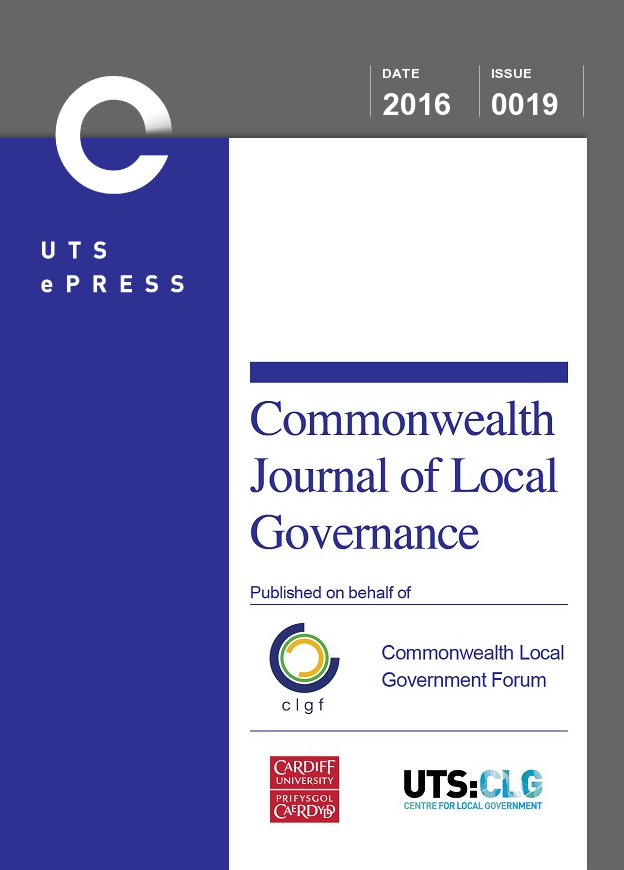Can organisation development principles in India's local governments improve governance?
Main Article Content
Abstract
This paper examines the application of organisation development principles to rural local self-government bodies in Karnataka, India with the objective of developing their organisational capacity and improving their efficiency. The premise is that strong gram panchayats (village councils) can address issues hindering service delivery and governance at the grass roots.
The paper illustrates the methodology used in the development of an innovative framework called Gram Panchayat Organisation Development (GPOD) and its implementation in action research mode in two village councils since 2011. It further explores the wider applicability of this framework, which has been extended to over 50 gram panchayats (GPs) since 2014. GPOD works towards strengthening the panchayat as an organisation in its entirety, rather than by tackling stand-alone components. It includes building a shared vision in the panchayat, mapping and re-engineering key processes, developing accountability and incentive structures, and supporting the village body in developing and implementing its annual plans. The approach has evolved to its present form based on real-time change management initiatives in GPs in which politically elected members participated in decision-making and implementation. We argue that by following the principles of organisation development and aligning the panchayat’s organisational components, marked improvements in local governance and service delivery were achieved. Impact is captured in terms of systemic outputs such as annual plans, accountability structures and activation of defunct committees, as well as improvements in services such as health, sanitation, drinking water, etc. The paper also includes a critique of the challenges faced as GPOD was scaled up to include new areas.
Article Details
Issue
Section
Authors who submit articles to this journal from 31st March 2014 for publication, agree to the following terms:
a) Authors retain copyright and grant the journal right of first publication with the work simultaneously licensed under a Creative Commons Attribution License that allows others to share and adapt the work with an acknowledgement of the work's authorship and initial publication in this journal.
b) Authors are able to enter into separate, additional contractual arrangements for the non-exclusive distribution of the journal's published version of the work (e.g., post it to an institutional repository or publish it in a book), with an acknowledgement of its initial publication in this journal.
c) Authors are permitted and encouraged to post their work online (e.g., in institutional repositories or on their website) prior to and during the submission process, as it can lead to productive exchanges, as well as earlier and greater citation of published work (See The Open Access Citation Advantage Service). Where authors include such a work in an institutional repository or on their website (ie. a copy of a work which has been published in a UTS ePRESS journal, or a pre-print or post-print version of that work), we request that they include a statement that acknowledges the UTS ePRESS publication including the name of the journal, the volume number and a web-link to the journal item.
d) Authors should be aware that the Creative Commons Attribution (CC-BY) License permits readers to share (copy and redistribute the work in any medium or format) and adapt (remix, transform, and build upon the work) for any purpose, even commercially, provided they also give appropriate credit to the work, provide a link to the license, and indicate if changes were made. They may do these things in any reasonable manner, but not in any way that suggests you or your publisher endorses their use.
For Issue 13/14, and all issues before, the following copyright applied:
Authors submitting a paper to UTS ePRESS publications agree to assign a limited license to UTS ePRESS if and when the manuscript is accepted for publication. This license allows UTS ePRESS to publish a manuscript in a given issue. Articles published by UTS ePRESS are protected by copyright which is retained by the authors who assert their moral rights. Authors control translation and reproduction rights to their works published by UTS ePRESS. UTS ePRESS publications are copyright and all rights are reserved worldwide. Downloads of specific portions of them are permitted for personal use only, not for commercial use or resale. Permissions to reprint or use any materials should be directed to UTS ePRESS via the journal's main editor, Alison Brown, journal@clgf.org.uk
